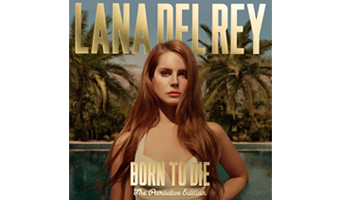With her distinctive calling-card single “Video Games” and album Born To Die, Lana Del Rey has been one of the most hotly debated artists of the past year. Initially feted for her “gangsta Nancy Sinatra” sound and DIY Youtube aesthetic, the blog love quickly faded with some flat live performance and the news that, far from a trailer park ingenue, Ms Del Rey is the daughter of a rich investor. Lana haters became as ubiquitous–and as vocal–as her defenders. It’s surprising, then, that neither have really been out in force with the release of her new “Paradise Edition” of Born to Die. Is the hype over?
“The Paradise Edition” is one of those increasingly necessary releases of new “product” that extend the shelf-life of modern albums, a new set of seven songs complete with single and videos continuing the same basic aesthetic. Nicki Minaj has done this twice with her debut Pink Friday, with Pink Friday: Roman Reloaded and the forthcoming Pink Friday: Roman Reloaded – The Re-up, to general success. So of itself, it’s not the tangled, frankly uninspiring, format that appears to be holding Del Rey back here.
The seven new songs here are, on the whole, rather good, each refining and extended the LDR sound, roughly an American take on trip-hop with sumptuous strings, smoky vocals and rickety breakbeats. Del Rey adds her own distinctive lyrical pre-occupations with Americana icons like Elvis, Jim Morrison and Springsteen (both of whom are namedropped here), putting forth peons to drugged-out sex and unhealthy relationships.
Of which: so far, so good. The single “Ride” has hooks for days, setting out across the MOR highway with its sparse drums and restrained vocals. “Blue Velvet” was recorded for a H&M ad, a cover of the 50s song, winking heavily at the David Lynch film of the same name for its video. Continuing the cinematic theme, “Gods & Monsters” stakes out a more explicitly Gothic take on the usual LDR sleaze (“me and God we don’t get along”), while “Body Electric” references poet Walt Whitman.
None of this is overly new territory for Lana Del Rey, but it is a distinct progression from the basic Born to Die template. Del Rey’s vocals are stronger in the new songs, the songwriting and production bombastic and a bit slicker. Unsurprisingly, it’s all very artful, a calculated triangulation of 50s girl group drama with B movie sleaze and lounge crooning. The narrator of these stories, “Lana Del Rey,” feels very much like a pastiche, just one more trope stitched together from pop culture references. Original it’s not, but as a conceit it works well enough.
Still, there’s no break-out hit, nor anything absolutely vital that compares to Born to Die’s best moments. “Cola” has gathered the most attention with its “my pussy tastes like Pepsi Cola” lyric. Sadly there is more fizz in that one line than the rest of the song, though.
Strangely enough, the album highlight comes in the form of one of Del Rey’s oldest songs “Yayo,” which has kicked around online in some form or other since 2009. Stripping back the production with some brush drums and soft piano, Del Rey’s vocals shine in the restrained setting, moving ably through her graveling lower range to its very top. For all her bravado and idealisation of scuzzy Nevada nightlife, it’s clear from the middle eight (“Hello heaven/you are a tunnel lined with yellow light/on a dark night”) that the character may well meet an untimely end sometime soon (perhaps a Nick Cave style collection of murder ballads is on the cards?). Whether or not the “Paradise Edition” grabs the zeitgeist like its predecessor, the “Lana Del Rey” character continues for now to be compelling in its mix of nihilism and bruised romanticism–”born to die” indeed.

